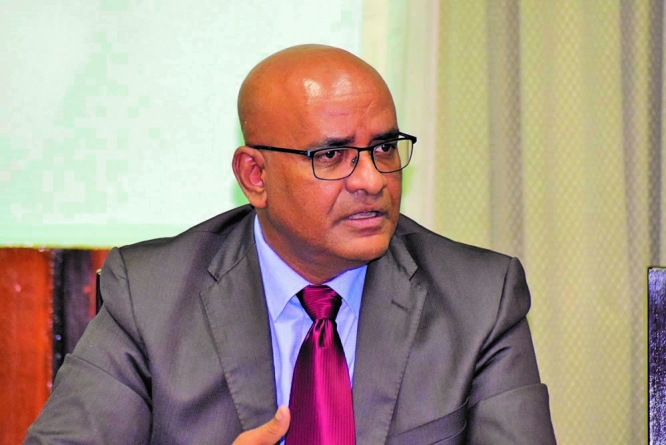Govt. to close loopholes in Liza permits with safeguards from Payara
Vice President, Dr. Bharrat Jagdeo, yesterday announced that the Government will endeavour to close loopholes in the Liza Phase One and Two project permits which allow grave environmental infractions at ExxonMobil’s operations offshore Guyana.
The Vice President made his comment, following a landmark ruling of the High Court in October, which brought the two Liza environmental permits into conformity with the law.
Former President of the Transparency Institute Guyana Inc. (TIGI), Dr. Troy Thomas, had brought the matter before the Court, noting that while the law allows for a five year environmental permit to be issued, the recently ousted coalition, A Partnership for National Unity + Alliance for Change (APNU+AFC), granted permits meant to last two decades, to the Stabroek block co-venturers.
The Court order reduced the term of Exxon’s Liza I environmental permit down to five years. It will expire on 1st June, 2022 instead of 2040. The order made by the High Court also reduced the Liza Two environmental permit to five years. It will expire in 2024 and not 2043 as in the initial permit issued by the EPA.
Jagdeo hailed the provisions in the Payara environmental permit as improvements on their predecessors, which were granted by APNU+AFC.
“You will see,” he said, “that they were vastly different in the range of issues covered and the protection of national interest than the Liza agreements.”
The Payara environmental permit of 24th September 2020 was issued for five years in conformity with the law.
Upon its approval of Payara, government said it strictly prohibited routine flaring without approval from the Environmental Protection Agency (EPA), and explicitly stated that any flaring to maintain oil production is not allowed.
According to the permit, ExxonMobil will be expected to compensate the government for the cost of wasted gas during flaring and will be subject to fines under the EPA which are related to emissions from flaring. It is also expected to establish a framework for a carbon price in line with international standards.
ExxonMobil had intended to preserve loopholes in its future projects which it exploits in the Liza Phase One permit to flare natural gas.
The Payara production license has put a 60-day cap on startup flaring, and includes emergencies, maintenance and restart as “special circumstances.” ExxonMobil will also be expected to report all instances of gas flaring within 24 hours, whether allowed or not, and explain why such flaring has occurred.
Notably, ExxonMobil has been flaring at its Liza-1 operations all year.
The other environmental issue which made headlines during the review of the Payara Field Development Plan (FDP) is that of the treatment of produced water.
Government said that it has required Exxon to include tie-in points and space for produced water injection equipment, in its base design.
Government intends to oversee a study to be conducted by Exxon by the first quarter of 2021 to examine the safe and efficient reinjection of the produced water, and determine the effects of the reinjection on the reservoir. The Payara licence states that the study will also seek to determine how the effects of dumping produced water in the ocean can be minimized. Government said that this is in keeping with its commitment to preserve marine life and water quality.
Notably, ExxonMobil has been dumping thousands of barrels of produced water into the ocean every day, at its Liza Phase One operations.






















